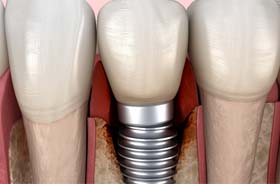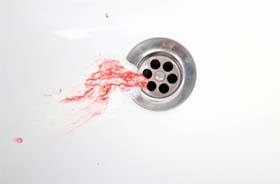Dental Implant Failure & Salvage – Plymouth, MA
Preserving Your Restored Smile

Dental implants are a consistently successful treatment; they thrive in more than 95% of cases. However, there is always a small chance that you will have to deal with a failed dental implant in Plymouth. If you ever believe that something is not quite right with your restored smile, contact us right away. We will do all we can to address the problem, restore your oral health, and allow you to continue enjoying all the benefits of dental implants.
Why Do Dental Implants Fail?

The most common cause of dental implant failure is an infection known as peri-implantitis. It occurs when harmful bacteria attack the tissue around an implant. It can cause so much damage that the mouth is no longer able to support dental implants in Plymouth. Poor oral hygiene is often to blame for peri-implantitis, but genetics and other factors can also contribute to it.
Other possible causes of implant failure include:
- Unsuccessful osseointegration (the implant never bonds with the surrounding bone)
- Physical trauma
- Certain medication conditions, such as some types of cancer, that interfere with the body’s ability to support dental implants
Symptoms of Failed Dental Implants

There are two broad categories of dental implant failure. Early failure occurs shortly after the implant placement surgery, while late failure can happen at any time, even years or decades the initial procedure.
You should always be on the lookout for the following signs and symptoms:
- Unusual pain. Some discomfort is normal during the healing period after dental implant surgery. However, severe pain and pain that occurs after you have had your implants for a while are signs of a potentially serious problem.
- Signs of infection. Pus, red gums, bleeding gums, and receding gums are all signs of a possible infection and call for a visit to a qualified implant dentist.
- Difficulty chewing. You should be able to eat virtually anything with your dental implants. Problems in this area might indicate the need for treatment.
- An implant feels loose. In some cases, this is related to a damaged restoration. In other cases, the implant itself requires attention.
How Dental Implant Salvage Works

You should seek treatment as soon as you believe that something is off with your dental implants. Delays will only allow the problem the opportunity to get worse, increasing the need that you will require extensive or complex treatment.
When you come in for your appointment, we will perform a visual examination and may use our CBCT machine to understand what is happening beneath the gumline. Then, we will talk to you about your treatment options. You might need something as simple as antibiotics or a new restoration. You might also need to adjust your oral hygiene routine or make efforts to stop smoking.
If the damage to your oral tissues is severe, we may have to remove a dental implant altogether. Later, after a recovery period and some restorative treatments — perhaps including a bone graft — we may be able to place a new implant.
